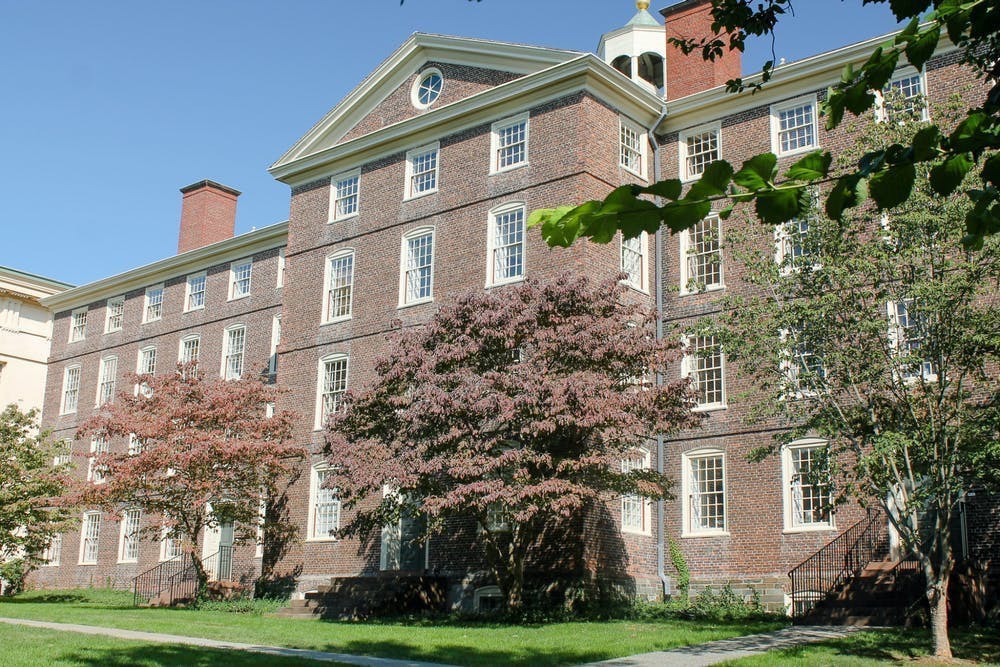The University has invited 16 female Afghan student applicants from the Asian University for Women to join the fall 2021 semester on humanitarian parole as non-degree students.
Presently, the students await transfer to the University on a military base in Wisconsin. “We are hopeful that they will be arriving next week, but we are still working with the government to try to determine when they may arrive,” said James Rowan ’08, chief of staff to the provost and associate provost of strategy.
Following the decision to host 10 to 20 Afghan students, the University organized a committee, overseen by the Office of the Provost, of more than a dozen offices within Brown to review application processes, establish academic logistics and prepare to offer support once the students arrive on campus.
A month has passed since the committee’s formation, and the University hopes the planning process is nearing implementation, said Asabe Poloma, assistant provost for global engagement. “In that month we met weekly, sometimes more than weekly, and spoke almost daily with many colleagues on campus,” she said. “So, the frequency and intensity of coordination has been very high.”
When selecting the 16 students, “we received a number of applications from AUW and worked together with admissions to determine which students we felt could be successful on Brown's campus,” Rowan explained. “We did not have a target, but we wanted a large enough cohort to make sure the students maintained a sense of community."
From the students offered a place in Brown's class, 14 have already enrolled. The two other accepted students are still considering possibilities other than Brown, according to Poloma.
Those choosing to attend Brown will register as non-degree students, which allows them to take courses for academic credit that they can use toward a degree at Brown or any other institution if they choose to transfer at the end of the spring 2022 semester.
This decision to enroll them as non-degree students was made because, “given the devastating circumstances for which the students are here, the possibility and the feasibility of returning to AUW — particularly for those coming from the Kabul or Bangladesh campuses — may not be (possible),” Poloma said. “It might mean that they are really starting over."
The students are under humanitarian parole, which grants up to two years of residency in the United States. In contrast to international students who hold an F-1 or J-1 visa, these students will not be sponsored by the University or be subject to the same time limits and regulations. After the two-year period, they will be eligible to apply for refugee status, which will "grant them many more rights and benefits to either continue their educational studies, pursue a career or any number of things they can choose to do in the U.S.,” including applying for U.S. residency or citizenship, Poloma said.
To smooth the students’ academic transition, the committee has worked closely with the College.
"We are really trying to think about what holistic advising looks like, what are their academic interests and the fit with the academic curriculum at Brown, whether it is undergraduate or graduate,” Poloma said. “We know there is a range of prior academic experience, so working with them as soon as they arrive to offer those individual supports will be really important.”
The committee has worked with faculty to identify course offerings, potential audit courses and options for independent studies. "We hope that when they do arrive they have access to the full open curriculum as any other student,” Poloma added.
The Global Brown Center for International Students is prepared to offer support once the students arrive at Brown. Andrew Heald, program director for the GBC, mapped out the center’s plan to provide orientation and ongoing transitional support. During orientation, GBC hopes to “facilitate immediate needs upon arrival to campus as well as community building and learning about Brown and Providence,” Heald said.
Beyond this first contact, GBC has partnered with the College to also guarantee academic assistance throughout their entire time at Brown. “Agency is really important to us and having the students help guide us in terms of which resources they want to know more about, what conversations they need to have with us and how we can further support their experience at Brown,” Heald added.
The New University in Exile Consortium, a partnered institution with Brown and other universities since the beginning of the initiative, is also interested in continuing to support Afghan students once they arrive on campuses across the United States.
“We are proposing to host probably every two weeks or once a month an online get-together with all the hosted Afghan students so they can share their experiences and keep in touch with each other,” said Arien Mack MA’60, founder of the New University in Exile Consortium.
Rowan said that “we would give (the students) the opportunity to opt in” to the New University’s initiatives, but the decision to partake would be at the students’ discretion.
On the subject of advocating for academic freedom, Poloma explained how “that work is the life-blood of many of our faculty here at Brown, including the Center for Middle Eastern Studies, the Watson Institute, as well as others who really shine a light and bring attention” to this matter.
As Brown awaits the students’ arrival, Poloma said, “We have just as much to learn and gain from their presence as, I hope, we have to provide by way of support to them.”

Julia Vaz was the managing editor of newsroom and vice president on The Herald's 134th Editorial Board. Previously, she covered environment and crime & justice as a Metro editor. A concentrator in political science and modern culture and media, she loves watching Twilight (as a comedy) and casually dropping the fact she is from Brazil.





